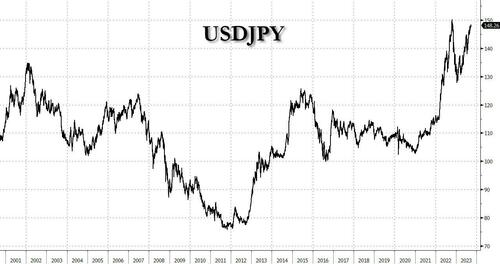Wednesday, October 18, 2023
Advancing Time: Lulled Into Complacency Again? Yes It Happens
Lulled Into Complacency Again? Yes It Happens
So are the markets merely resilient or is it a question of simply ignoring reality? It may be massive government spending or the lag effect has not yet hit us in the face. Risk management is a big part of successfully building wealth. Still, most of us are not as good at this as we would like to think. Even the smartest and most savvy investors on occasion fail to adequately protect themselves from downside risk.
The fact that central banks have the ability in our modern financial system to add liquidity to rapidly reliquefy a market is something that did not exist in the past. This adds a whole new dimension to both the financial system and the economy. It increases the ability to reverse a falling economy before it can devastate the financial system. Still, the idea you can end the boom-bust cycle has generated a slew of new problems.
This has created a situation that makes it extremely difficult to predict what will occur down the road. Today we are dealing with numbers and debt much higher than we had in the past. Part of this is because of inflation and some stems from society making it easier for the average person to take on debt. We cannot deny that an evolution is occurring in the currency market and how people view both money and wealth. The price of money and the quality of markets are two totally different animals that react to each other. True price discovery can be masked over but tends to reappear at some point or other.
 |
| Fed Chairman Bernanke Was Very Wrong |
The old Chinese curse, "may you live in interesting times" refers to and, in a tongue-in-cheek way, downplays times of danger and uncertainty. Nothing is as permanent as a temporary government program" is another humorous or sarcastic statement expressed in a serious manner. Today, we face both uncertainty and a slew of untested government programs that will most likely stay around for far too long.
 |
| You Don't Want To End Up Like This |
Still, macro concerns floating around higher interest rates have been brushed aside. Some market watchers are even talking about a "Goldilocks economy" or no landing, Both describe reaching the ideal state where an economy is not expanding or contracting by too much and growth is steady. After being protected from devastating and long-lasting setbacks in markets for decades with policies such as the Fed put, the fear of missing out has become strong. This is clearly demonstrated in the "buy the dip" style of investing where fear is put on the backburner.
 |
| There Is No Free Lunch! |
Cutting to the chase, investing is risky and you can lose everything. Even good companies can implode and become worthless. At this point, it seems the only thing that will tamp down the enthusiasm of many investors is a long-lasting hard reversion to the mean. This remains possible in many markets and exists somewhere between the lag effect and efforts to curb some of the forces driving debt ever higher.
How we view the world matters. If you accept the argument that we are, more or less, at the mercy of those in power, you have to be dubious. I find it difficult to think they will be fair or put our interest in front of theirs. In short, we should expect to be "played" or thrown under the bus when it benefits them.
If veteran investors such as Jeremy Grantham, the
"Bubble Historian" are correct, we are currently in a big one. Grantham
claims, that nobody could of logically or really predicted this when
referring to the market's action over the last decade or so. While being diversified may help, in the case of major market disruptions, it is no panacea or guarantee you will not get crushed. It has been pointed out by many chart-loving aficionados that a chart
pattern exists where a market falls hard, rallies strongly, and then falls to
much farther lows. This has happened in the past but history shows the real problem occurs when the economy goes with it and does not snap back.
(Republishing this article is permitted with reference to Bruce Wilds/AdvancingTime Blog)
Friday, October 13, 2023
Advancing Time: "Buyer Beware" Tax Sale Bidders Often Discount Risk
"Buyer Beware" Tax Sale Bidders Often Discount Risk
Last week the county where I live had its annual tax sale. Basically, this consists of an auction-type sale of all the properties that owners had failed to pay property taxes on or those that had fallen delinquent. One thing is very clear, the combination of too much money chasing too few properties is continuing to keep prices strong in this market. People entering this area of investing would be well to remember a fair degree of risk is involved when a person bids on such properties. When you are the high bidder you must immediately pay the amount you bid and then wait for a year while the current owner has total ownership rights to the property. During that time if the owner brings the taxes current including penalties and interest they get to keep the property and the buyer or bidder gets a hefty amount of interest on what amounts to a loan.
While prices have soared at local tax sales several issues exist
relating to the learning curve that new bidders may be unaware of, most
of this deals with the risk they may be overlooking in their enthusiasm
for a good return on their investment. Increasing the risk is the fact
that seminars are being held telling people this is a fast and easy way
to increase the yield they receive on investments and that if the person
is unable or simply does not redeem the property they may get a very
valuable property for a fraction of what it is worth on the open market.
Unfortunately, this means you will be bidding against people coming
from a seminar or investment workshop loaded with fresh knowledge and
who are so eager to "get a bargain" that they go plum crazy when it comes to
price.
 |
| Buyers Seeking Yield Often Throw Caution To The Wind |
Of course, the animal spirits at play vary from auction to auction. Sometimes they are driven by a good turnout, sometimes too much money in the economy, the fact people think they stand a good chance at getting a good return on their money, or just greed. While I will not argue that a buyer may get lucky and pick up a gem for below market price it is just as possible they may get far more than they bargained for in the way of grief.
It is important to remember rules vary from area to area. Today many of these sales are held online. The days of crowding into a courthouse are slipping into the past. Many areas are moving to a format such as that offered by GovEase with the idea they increase efficiency. Years ago, I remember leaving a sale when it became very apparent the bidding was sky-high from the get-go. The combination of QE and low interest rates drove bidders into a frenzy. Their search for higher yield resulted in them tossing caution to the wind.
It could be argued that an increasing number of these sales taking place online has resulted in speculators with a slew of money, both their own and that of investors, placing high-risk bets in markets they know little about and have had
little time to research. With many of these buyers not being real estate savvy and lacking the
time to even drive by the property as well as an inability to do the due
diligence required they often find that they wind up buying a pig in a
poke. In short, many of these people really have no
idea what they are buying. Adding to their risk is they often forget just how much prices
can vary in different areas, even within a city, location is everything.
 |
| Are You Moving That House? Wait, Please Bring It Back |
Properties placed in a tax sale often suffer from a number of problems such as pollution issues, flooding, or sewer problems. Also, properties put on the sales block because of unpaid taxes often have a great deal of deferred maintenance. It is important to remember the owner of these properties receives all monies bid in excess of the minimum bid if they do not redeem the property. This means if only 1,500 dollars of tax and penalties are owed on a house and it sells for 40,000 dollars at the tax sale the owner whether the person living in the house or even the mortgage holder has a claim on the overage.
If the property has enough issues, the owner of title often takes the money rather than redeeming the property. The flaw in bidding too much is that you may not get your ten to fifteen percent interest as promised but may indeed get the property and rather than a gem it might turn out to be a lump of coal. This can be a real problem for buyers from outside the area who can live hundreds or even thousands of miles away. While "Buyer Beware" warnings are issued, complicating the situation is a note that the IRS may also have a lien against the property. My county does not know how this might play out but indicates the IRS may not be in a hurry to sign off and release it.
 |
| Most Properties Are In Very Bad Condition |
Owners of property that are struggling to pay taxes often have bad
credit and other financial problems leaving them stretched to the limit,
with this in mind many who cannot come up with a thousand dollars have
little ability to raise a great deal more. When a person knows they are going to lose their property, that does not mean they will go
gently into the night. Anyone thinking a person having a property taken
from them will turn it over clean swept and in good condition may be
proven a bit over-optimistic.
As I stated earlier in this article, in the state where I live, the current owner has total
ownership rights to the property and a year to redeem the property. During the time a bidder must wait for a
Tax deed to be granted some rather ugly events can take place. If
it is rented this means they can squirrel away the rents, they
can remove or sell off key components of the building such as the
heating and cooling system. If a fire
occurs if insured by the current owner he or she would receive the
money and most likely not repair the property if they were about to lose
it. In some cases, a house or building is condemned and demolished by
the government and a lien for the cost put on the property meaning the
bidder would get an empty lot and a rather large bill.
Using the example above the property owner behind roughly a thousand dollars in taxes sees five hundred dollars of penalties and auction fees added on are told they will be given a full year to come up with the money plus fifteen percent of the bid. Normally this would add another two hundred twenty-five dollars bringing the total to seventeen hundred and fifty. The problem for such an owner is that if it brings forty thousand dollars at the sale. Fifteen percent of forty thousand dollars comes to six thousand dollars. This brings the amount needed to redeem the property to seventy-five hundred dollars, an amount totally out of the reach for many of these people. In this high-risk game it would be wise for both bidders and those watching their property being put up for sale to ask, "Do I feel lucky?"
(Republishing this article is permitted with reference to Bruce Wilds/AdvancingTime Blog)
Saturday, October 7, 2023
Advancing Time: China Could Derail Japan's Fragile Recovery
China Could Derail Japan's Fragile Recovery
 |
| China And Japan As Part Of Global GDP |
A matter that has not garnered enough attention is how economic problems that develop in China will spill over and directly impact Japan. While a strong distrust possibly even a dislike between the people and cultures exists, years ago the two countries joined together in an effort to maximize profits from exporting to America.
Over the years this relationship has morphed into an almost full-blown interdependence. This has intensified as China and Japan became major trading partners with Japanese direct investments surging and Japanese technology playing a critical role in the development and competitiveness of China’s global supply chains. In some ways, the two have become joined at the hip.
It is difficult to envision how Japan can decouple from the mess now occurring in China. Flowing out of my last posting is an important and unanswered question. how much would the Japanese yen have to fall to put Japan into a good place, or even a reasonable place? This means putting Japan in a position where it could get its budget in order and have the possibility to stabilize its national debt. There is no way to answer such a question. A huge number of variables feed into this issue, the largest are centered around which fiscal pathway Japan chooses going forward.
Reuters recently pointed out that Japanese policymakers were very concerned about China's deepening economic woes. If Beijing fails to rapidly bolster its economy with more stimulus. Looming large is the fact that China's downturn will have a huge effect on Japan's export-reliant economy. This is a double whammy since it comes just as an aggressive Federal Reserve raises interest rates to slow growth in the United States to lower inflation.
- China's downturn has weakened Japan's external support
- The China risks will be debated and are already hitting the yen
- Japanese investments in China are at risk
- The darkening global outlook complicates a BOJ exit path
The latest available country-specific data shows the two biggest customers of products exported from Japan were bought by mainland China (19.4% of Japan’s global total), and the United States with (18.7%). A major concern for Japan is that across the world we are seeing economic momentum fade. As stated in another AdvancingTime article, we should never discount the American consumer's role as a key driver of the global economy. Many people simply don't understand the dire implications America's slowing economy will have on the world.
Other countries manufacture the goods Americans buy, which makes America a key component in their economies. When the American consumer pulls back, factories across the world see orders fall. Japan's economy is struggling, its recovery remains fragile. Core inflation which has been in the range of 3.0-3.5 percent. The BOJ is well aware that developments in financial and foreign exchange markets have a direct impact on Japan's economic activity and prices.
 |
| The Yen Is In A Precarious Position |
Governor Ueda has indicated that its position on ending negative rates has not changed but he wants to avoid ruling anything out and limiting its options. He also made it clear that when the goal of sustained 2% inflation is in sight, the BOJ will consider ending its YCC policy as well as raising interest rates. The fact is, the BOJ can never stop yield curve control and it is costing the BOJ a fortune. In reality, the BOJ is Japan's long-term bond market. The bank's ownership of the 368th series of 10-year Japanese government bonds is near total, at 97.0% on Jan. 10, This is up from 86.4% on Dec. 22, according to reports by a fixed income strategist at Mitsubishi UFJ Morgan Stanley Securities.
As pointed out in my last article; Japan's Yen, Where It Goes From Here, the main factor currently supporting the yen are comments from Japanese government officials that they are ready to support the currency if it moves lower. While a country's currency and economy are not the same animals, one does affect the other. Considering the close ties noted above, it is not unreasonable to think that debt defaults in China could take a toll on Japan. Also, Japan's automotive sector, the 3rd largest in the world, with 78 factories in 22 regions & employing over 5.5 Mn people, is under pressure. Sure a lower yen helps exports but it increases the costs of imports. With the price of imports continuing to rise and huge investments in China, what could go wrong?
(Republishing this article is permitted with reference to Bruce Wilds/AdvancingTime Blog)
Sunday, October 1, 2023
Advancing Time: Japan's Yen, Where It Goes From Here
Japan's Yen, Where It Goes From Here
Several factors feed into this complex issue. One geopolitical pundit recently voiced the opinion / commented that the Japanese would not abandon the yen based on the idea of loyalty and pointed out that the culture of Japan is different from that of other countries. I beg to differ with his assessment and stand by a statement I wrote years ago:
When investors in Japan's government bonds begin to believe that Abenomics will be successful in bringing back inflation it would be logical for owners of JGBs to move out of low-yielding securities and buy foreign bonds or equities. The moment the Japanese stock market fails to rise enough to offset a falling yen and inflation this will turn into a tsunami of money fleeing Japan and constitute the end of the line for those left holding both JGBs and the yen.
It is very likely that the yen will only fail once, and it is impossible to predict when or how fast it will occur once it starts. Japan must move on. Japanese Prime Minister Shinzo Abe is gone, and the long-time Governor of the Bank of Japan (BOJ) Kuroda Haruhiko has stepped down. Japan is in a situation where the BOJ may view ending its easing cycle remains too terrifying to even start. The BOJ can never stop yield curve control and it is costing the BOJ a fortune. The BOJ has become Japan's long-term bond market.
During his press conference following a recent policy announcement, the new BOJ governor Kazuo Ueda, clarified that the “distance to ending negative rates” hasn’t really changed. He explained he had simply wanted to avoid ruling anything out and limiting the BOJ’s options. Ueda reiterated that when the goal of sustained 2% inflation is in sight, the BOJ will consider ending its YCC policy as well as raising interest rates. Kuroda's successor said that the BOJ has long placed a greater emphasis on the risk of tightening too soon over the possibility of being behind the curve in raising rates.
Ueda says there’s no change to this “risk management” tendency. Speaking of the currency, Ueda said it’s desirable for currency rates to reflect economic fundamentals and to move in a stable fashion. Udea declined to comment on "short-term" currency moves, which have seen the yen plunge. The yen has been the Developed World's Turkish lira this year. It has cratered from 130 to 148, weakened even more on what was widely seen as a dovish BOJ stance. This drop has been restrained by comments from government officials that they are ready to act on sharp moves.
Of course, in the end, intervention to support the yen will be the call of Japan's Minister of finance and not the BOJ. Still, the BOJ has no other choice than to be "fully aboard" such a decision. This is a political call that has market watchers thinking a burst of FX intervention will occur here around the 150 level. This has created the notion that risk-reward doesn’t favor being long USD/JPY at current levels.
Japan's
long-suffering population can sustain only so much inflation and will demand a different PM if the
current one is willing to risk currency collapse just to preserve fake
bond market stability for a little longer. History has proven this does not work. Soaring inflation has been above the 2% inflation target
since April 2022, and even above US CPI at times.
 |
| The Yen Is Nearing What Some Currency Traders View As The Critical 150 Mark |
A country can always drive its currency downward, however, supporting it is much more difficult. To drive a currency lower a country only needs to print and sell its currency using it to buy one or more of the other three reserve currencies. With this in mind, remember in recent years, part of the yen's strength seen may be attributed to the fact Japan had strong economic ties to the strong Chinese economy. Today, the collapsing economy in China has become a drag unless you are factoring in the idea wealthy Chinese are using business ties to move wealth out of China. This tight relationship can be seen each time trouble surfaces in China's economy. When this happens the yen rises in value as wealth exits China through business back-channels.
Returning to the idea the Japanese people may at sometime bolt and throw the yen under the bus, add into this mix is Japan's huge carry trade in which many citizens are now participating. Planet Finance, recently posted a video focused on the growing number of retail traders in Japan. Knowing they won't get interest on their savings for decades creates a low threshold for the one-and-a-half million Japanese individuals in this dangerous and volatile market.
Footnote; The next post will focus on how China's deepening economic woes are likely to impact Japan's fragile economic recovery.
(Republishing this article is permitted with reference to Bruce Wilds/AdvancingTime Blog)


